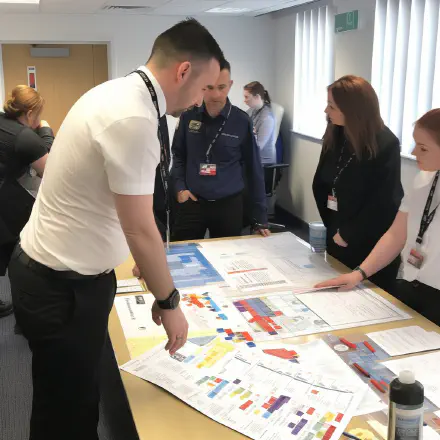
Compromise
Compromising is an essential part of any negotiation. It involves finding a middle ground where both parties can come to a mutual understanding. Without compromise, negotiations can reach a standstill, making it difficult for both parties to achieve their goals.
When using the word “compromise” in your negotiations, it is important to convey your willingness to find a mutually beneficial solution. This will help to build trust between you and the other party, and create an atmosphere of collaboration and cooperation.
It is also important to remember that compromise does not mean giving in to the other party’s demands. Rather, it is about finding a solution that meets both parties’ needs. By focusing on compromise, you can create a win-win situation where both parties feel satisfied with the outcome.
In summary, conveying your willingness to compromise in your negotiations can have a significant impact on the outcome. It shows that you are open to finding a mutually beneficial solution and can help to build trust and cooperation between you and the other party.
Collaborate
Collaboration is an important aspect of negotiation, and it is not just about working together. It is about achieving a common goal that benefits both parties. When negotiating, it is important to emphasize on collaboration to create a win-win result.
One way to do this is by discussing the common interests that both parties share. By identifying these interests, it becomes easier to come up with a solution that satisfies both parties. This creates a sense of teamwork and fosters a positive relationship.
Emphasizing collaboration also shows that you are not just focused on your own goals, but are also interested in the other party’s goals. This not only builds trust, but also helps to create a long-term partnership.
When negotiating, keep in mind that the other party wants to feel valued and respected. By emphasizing on collaboration, you are demonstrating that you value their input and are willing to work with them, not against them. This can also help to ease any tension or conflicts that may arise during the negotiation process.
Remember, negotiation is not about winning or losing, it is about finding a solution that benefits both parties. Emphasizing collaboration and teamwork can help you achieve this goal and establish a positive relationship with your counterpart.
Innovative
Negotiation is a complex process that requires an innovative approach to achieve a win-win scenario. Innovative techniques involve crafting solutions that are unique and not commonly used in the industry. As a negotiator, you can leverage the power of innovation to help achieve your goals while staying open to new ideas.
Here are some ways you can use innovation in your next negotiation:
-
Think outside the box: Instead of sticking with conventional methods, brainstorm new ways to approach the negotiation. For example, suggest a payment structure that is tailored to the specific needs of both parties involved.
-
Be creative with your offers: Offer innovative terms to your counterpart that add value to both parties. This can include exchanging skills or resources instead of cash, providing discounts to future purchases, or bundling services together for a discounted rate.
-
Explore new technologies: Explore the possibility of using new technologies to streamline the negotiation process and make it more efficient. This can include virtual meeting spaces, electronic signatures, or collaborative document editing tools.
-
Analyze market trends: Undertake market research to understand current trends and emerging technologies that could impact the negotiation. Use this knowledge to provide insights and innovative solutions to the other party.
Overall, innovation sets a negotiator apart from others, and it can make a negotiation more successful. By being open to new ideas, taking calculated risks, and leveraging your skills, you can use innovative techniques to achieve a mutually beneficial outcome.
Impressive
When negotiating, it’s important to make sure your counterpart feels respected and valued. Using the word “impressive” can do just that. By acknowledging their accomplishments or achievements, you can establish a positive relationship and build rapport.
Here are some examples of how to use “impressive” in negotiation:
-
“It’s truly impressive what your team has achieved so far. I would love to find a way to work together and build on that success.”
-
“I found your proposal to be very impressive. I think we can come up with a plan together that will benefit both of us.”
-
“You have an impressive track record in this industry. I’m confident we can achieve great things if we work together.”
By using “impressive,” you can make the other party feel confident in their abilities and more open to negotiation. It can also show that you are willing to acknowledge their strengths and work with them towards a mutually beneficial solution.
Persuasive
In a negotiation, it is crucial to be persuasive. Your ability to persuade and convince people can make or break a deal. One of the ways to be persuasive is by understanding your counterpart’s needs and concerns. Once you have identified them, you can position your proposal in a way that addresses those concerns, making it difficult for them to refuse.
Another way to be persuasive is by using stories. People remember stories much better than facts and figures. By weaving a story into your proposal, you can appeal to your counterpart’s emotions and create a memorable image in their mind. For example, if you are negotiating a salary increase, instead of just providing a list of reasons why you deserve it, tell a story of how your work impacted the company in a positive way.
It is also important to be confident in your argument. If you don’t believe in what you’re saying, your counterpart won’t either. Stand firm in your position, but be open to compromise if it means securing a deal.
Finally, always remember to listen. Persuasion is not just about talking but also about understanding. Listen to your counterpart’s concerns and needs, and use them to your advantage in your proposal.
As Dale Carnegie said, “You can make more friends in two months by becoming interested in other people than you can in two years by trying to get other people interested in you.” Being persuasive is not just about getting what you want but also about building a relationship of trust and respect with your counterpart.
Valuable
Negotiations are all about discussing something that has value. It could be services, products, or assets. Thus, it is essential to show that you recognize and appreciate the worth of what is being discussed. This can be done by emphasizing the word “valuable” while communicating with the other party.
Using this word shows that you understand the importance of the negotiation, and it shows that you are serious about it. It can help to create a sense of urgency, so both parties can move forward in the discussion to come to an agreement.
Additionally, it is crucial to show the other party that you see value in what they offer. If they feel that you do not appreciate or understand their propositions, they might become disinterested in the negotiation. Therefore, when using the word “valuable,” make sure to emphasize the importance of both parties’ proposals.
“I understand the valuable product or service you are offering, and I believe it will be an excellent addition to my company. Let us discuss further and explore ways to work together.”
In summary, using the word “valuable” in your negotiations shows that you understand and appreciate the importance of the discussion. It helps to create a sense of urgency and demonstrates that you are serious about the negotiation. Remember to show the other party that you appreciate the value of their offer to establish a positive relationship.


